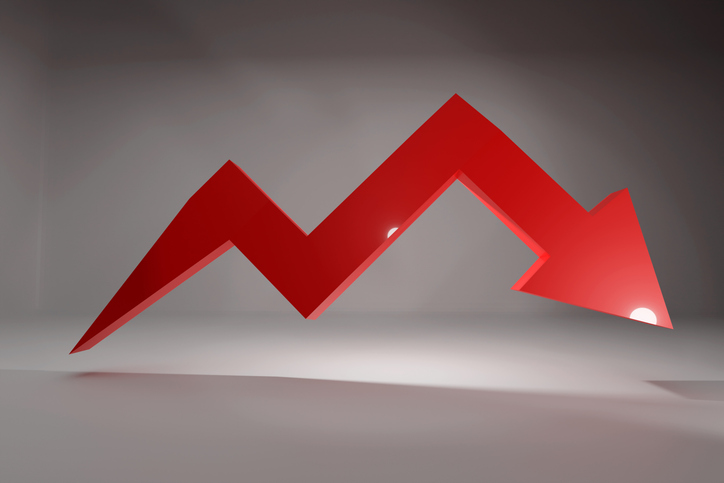8 Stocks to Benefit from Rising Interest Rates
Donald Trump's election as president has fueled a powerful stock-market rally rooted in expectations of faster economic growth in 2017.


Profit and prosper with the best of Kiplinger's advice on investing, taxes, retirement, personal finance and much more. Delivered daily. Enter your email in the box and click Sign Me Up.
You are now subscribed
Your newsletter sign-up was successful
Want to add more newsletters?

Delivered daily
Kiplinger Today
Profit and prosper with the best of Kiplinger's advice on investing, taxes, retirement, personal finance and much more delivered daily. Smart money moves start here.

Sent five days a week
Kiplinger A Step Ahead
Get practical help to make better financial decisions in your everyday life, from spending to savings on top deals.

Delivered daily
Kiplinger Closing Bell
Get today's biggest financial and investing headlines delivered to your inbox every day the U.S. stock market is open.

Sent twice a week
Kiplinger Adviser Intel
Financial pros across the country share best practices and fresh tactics to preserve and grow your wealth.

Delivered weekly
Kiplinger Tax Tips
Trim your federal and state tax bills with practical tax-planning and tax-cutting strategies.

Sent twice a week
Kiplinger Retirement Tips
Your twice-a-week guide to planning and enjoying a financially secure and richly rewarding retirement

Sent bimonthly.
Kiplinger Adviser Angle
Insights for advisers, wealth managers and other financial professionals.

Sent twice a week
Kiplinger Investing Weekly
Your twice-a-week roundup of promising stocks, funds, companies and industries you should consider, ones you should avoid, and why.

Sent weekly for six weeks
Kiplinger Invest for Retirement
Your step-by-step six-part series on how to invest for retirement, from devising a successful strategy to exactly which investments to choose.
Donald Trump's election as president has fueled a powerful stock-market rally rooted in expectations of faster economic growth in 2017. And with faster growth is likely to come higher interest rates.
Long-term bond yields have already surged, and the Federal Reserve is likely to raise its benchmark short-term interest rate by 0.25 percentage point on December 14. That would be the first hike in 12 months. Many economists believe the Fed will boost rates twice more in 2017.
And although rising rates are bad news for some businesses, they're a boon for others—particularly banks: When the Fed raises its rate, nearly all banks immediately raise their prime lending rate, the rate (now 3.5%) that banks charge their most creditworthy customers, by the same amount. But they're far slower to lift what they pay on deposits, so they earn a wider "spread" between the rates at which they lend and the rates they pay depositors.
Banks also could gain from Trump's promise to ease financial regulation. And if the economy improves—still a big “if”—so could demand for loans, and credit quality in general.
We went hunting for banks and other companies that could benefit from rising rates and chose eight standouts.
Stocks are listed alphabetically. Prices and related figures are as of December 6. Price-earnings ratios are based on estimated earnings over the next four quarters. Average of analysts’ earnings estimates are from Zacks Research System.

Bank of America
- Symbol: BAC
- Share price: $22.16
- Market capitalization: $224 billion
- Price-earnings ratio: 14
- Dividend yield: 1.3%
- The business: With $2.2 trillion in assets, Bank of America is the nation's second-biggest bank, behind JPMorgan Chase (JPM). BofA has spent the past seven years rebuilding from its near-death experience during the financial crisis, when it was saved by a government capital injection (since repaid). Thanks to rising deposits, modest loan growth and an ongoing cost-cutting program, the bank is expected to earn roughly $16 billion, or $1.47 per share, in 2016, its best profit since 2007.
- Why rising interest rates will help: As with most banks, BofA's earnings have been held back by the Fed’s decision to keep short-term interest rates at extraordinarily low levels since the financial crisis. The Fed's expected 0.25-percentage-point rate hike this month, perhaps followed by more in 2017 and 2018, will provide a strong tailwind for BofA: The bank calculates that a one-percentage-point rise in short- and long-term rates would boost its net interest income by $5.3 billion over the following 12 months. To put that sum in perspective, it would have lifted BofA's total 2015 net interest income by 13.5%. And if tax cuts and deregulation stoke the U.S. economy in 2017, fueling new bank loan demand, that could further drive earnings.
- Stock valuation: All banks should benefit from higher rates. But brokerage Keefe, Bruyette & Woods says it expects BofA to have "the best earnings trajectory of its peers," thanks to a business mix that includes domestic lending, money management and exposure to Wall Street via BofA’s ownership of Merrill Lynch. The stock has rallied this fall. But at 14 times the average of analysts’ year-ahead earnings estimates, the valuation, Keefe says, is "still reasonable"—assuming further rate increases and given the potential for heftier dividend growth than at many of its rivals.

Bank of New York Mellon
- Symbol: BK
- Share price: $47.99
- Market capitalization: $50.7 billion
- Price-earnings ratio: 14
- Dividend yield: 1.6%
- The business: Long before Alexander Hamilton's life became the subject of a blockbuster Broadway musical, the founding father’s business legacy was a hit on Wall Street. Bank of New York Mellon, which he launched in 1784, remains a huge player in finance. But instead of traditional banking, the company mainly provides vital services to other financial firms that control $30.5 trillion in assets. Those services include securities custody, record-keeping and clearing of trades.
- Why rising interest rates will help: Like many banks, Bank of New York Mellon has been hurt as record-low interest rates since 2008 have limited its ability to make money on loans and fixed-income investments. So rising rates will boost that part of its business. But the bigger prize is the potential payoff from the bank’s new focus on efficiency after a long string of pricey acquisitions. CFRA Research figures that Bank of New York Mellon bought about 90 related businesses over the past 10 years (including rival Mellon Financial in 2007). The focus on cost-cutting is now paying off: In the first nine months of 2016, non-interest expenses (such as corporate costs) fell 3% from the same period in 2015. That helped boost net income by 7.7%, even as revenue was flat, at $11.4 billion.
- Stock valuation: With the stock priced at 14 times estimated year-ahead earnings, investors seem wary about the company's growth outlook. But fans say Bank of New York Mellon's long-term appeal lies in its deep client relationships, which Morningstar notes tend to be "sticky"—meaning clients mostly stay put. If the money-management industry continues to grow worldwide, that should mean rising demand for Bank of New York Mellon's services. But investors should note that the company faces a number of risks that are more significant than for other big banks—including the downward pressure on investment-management fees stemming from the dramatic shift in the U.S. out of actively managed funds and into index funds.

Berkshire Hathaway
- Symbol: BRK-B
- Share price: $161.34
- Market capitalization: $396 billion
- Price-earnings ratio: 20
- Dividend yield: none
- The business: Warren Buffett's company is perhaps America's most diversified conglomerate. It's expected to generate $222 billion in revenue in 2016 from such varied businesses as insurance, railroads, energy, aircraft parts, retailing, candy and furniture. Berkshire also controls a mammoth stock portfolio, including big stakes in Coca-Cola (KO), International Business Machines (IBM), Kraft Heinz (KHC) and Wells Fargo (WFC).
- Why rising interest rates will help: Berkshire's insurance operations, including Geico, stand to earn higher returns on their "float": the cash they take in every day from premiums, then reinvest in interest-paying accounts and securities until needed to pay claims. In 2015, that float was a massive $88 billion. That's one element of the huge amount of cash Buffett likes to keep on hand. As he wrote in Berkshire’s 2015 annual report, "In banking terms, Berkshire is—and always will be—heavily asset-sensitive and will consequently benefit from rising interest rates." What's more, Berkshire's big stakes in bank and other financial stocks mean it wins if they win from higher rates. Besides Wells Fargo, Berkshire owns chunks of American Express (AXP), Bank of America, Goldman Sachs (GS) and U.S. Bancorp (USB). Finally, if rising interest rates are rooted in stronger economic growth, that's another plus for Berkshire’s vast stable of companies.
- Stock valuation: Buffett has long measured Berkshire's success by growth of shareholders' equity, or book value (assets minus liabilities). At September 30, that totaled $109.19 per Berkshire class B share. At the current share price, buyers are paying about 1.5 times book value. Buffett has said he considered Berkshire to be undervalued at 1.2 times book value. So the stock is at a premium to that "bargain" level—but not an outsized premium, given Berkshire's promising long-term growth outlook.
QUIZ: How Well Do You Know Warren Buffett?

Capital One Financial
- Symbol: COF
- Share price: $87.84
- Market capitalization: $42.4 billion
- Price-earnings ratio: 11
- Dividend yield: 1.8%
- The business: The eighth-biggest U.S. bank by assets, with $313 billion, Capital One is best known for its huge credit card business—and the marketing line "What's in your wallet?" Cards generate about 59% of the bank's profit. But Capital One also has become a major provider of auto and business loans as it has doubled in size since 2007.
- Why rising interest rates will help: Higher market rates should give Capital One more flexibility in raising rates on its credit cards and other loans. That could allay some investors' concerns about the risk of rising bad loans stemming from the company’s fast loan growth rate. In the third quarter, total loans outstanding were up 12% from the year-earlier quarter, to $238 billion. Meanwhile, earnings have been depressed in 2016 in part because, as the bank lent more, it also set aside more money for possible loan losses. Actual loan charge-offs also have risen this year. But Capital One terms that "growth math": The bank allows early on for a weeding-out of bad borrowers, then reaps the benefits of the remaining good borrowers for years afterward.
- Stock valuation: Investor concerns about Capital One's lending risk have depressed the stock relative to earnings, with the shares selling for 11 times estimated year-ahead profits. Colin Plunkett, an analyst at Morningstar, believes Capital One "does not receive the respect it deserves." He notes that, unlike many banks, Capital One remained profitable during the financial crisis. Erik Oja, an analyst at CFRA Research, says small businesses could benefit from Trump administration policies, and that could be a plus for Capital One because many small-business owners use credit cards to finance expansion.

Charles Schwab
- Symbol: SCHW
- Share price: $39.27
- Market capitalization: $52 billion
- Price-earnings ratio: 26
- Dividend yield: 0.7%
- The business: Since 1971 Schwab has been synonymous with the rise of discount brokerage and low-cost investing in general, a boon for individual investors. The firm also has become a key provider of services to independent financial advisers. Revenue is expected to top $7.5 billion in 2016, up 53% since 2012.
- Why rising interest rates will help: Trading commissions were once Schwab's bread and butter, but they have faded in importance. CFRA Research says Schwab derives 40% of its revenue from interest income, such as by lending to upscale clients via its Schwab Bank. That becomes an even better business as interest rates rise. Likewise, higher rates mean Schwab's money market funds, another parking place for clients' cash, become profitable again; like many fund operators, Schwab has been waiving portfolio management fees for years because short-term rates were so close to 0%. On the trading side, Schwab stands to benefit if rising rates cause more investors and advisers to adjust their portfolios—by, for example, selling bonds and buying stocks.
- Stock valuation: At 26 times estimated earnings, the stock isn't cheap. But Schwab’s fans say the franchise has tremendous value and has considerable appeal for investors who can take a long-term view. Morningstar estimates that Schwab's operating income should nearly double over the next five years, as an aging population demands more financial help. Given Schwab's "massive scale," Morningstar says, it is "one of the only companies that can make online advisory for the masses profitable."

Goldman Sachs Group
- Symbol: GS
- Share price: $231.38
- Market capitalization: $97 billion
- Price-earnings ratio: 13
- Dividend yield: 1.1%
- The business: Goldman Sachs is both praised and vilified for its role as perhaps Wall Street's savviest player. It is a leader in providing financial advice to corporations (such as on merger deals), underwriting of stocks and bonds, asset management, trading, and lending. But it's a much smaller enterprise than before the financial crisis: Estimated 2016 revenue of $30.1 billion compares with $46 billion in 2007.
- Why rising interest rates will help: Like all lenders, Goldman should get a boost if the Federal Reserve pushes short-term rates up further and long-term rates follow. Looking to cash in, Goldman in October launched Marcus, a new online consumer lending business. Higher interest earnings would complement the rising income Goldman earns from its growing asset- management business. But a sustained upturn in interest rates would benefit Goldman in other ways as well. Analyst David Konrad at brokerage Macquarie Capital says that higher rates stemming from a faster-growing U.S. economy would boost merger activity and new corporate stock issuance—two big businesses for Goldman. Overall, the breadth of Goldman's expertise means it has "more earnings levers [to pull] than peers," Konrad says.
- Stock valuation: Goldman's shares have surged 66% since late June, lifting the price higher than it was in mid 2015 and pushing up the year-ahead price-earnings ratio to 13. A relatively low P/E is appropriate given the potential volatility of Goldman's earnings. Still, brokerage Keefe, Bruyette & Woods thinks the price is "still reasonable" as a way to bet on a raft of new business for Goldman in a stronger economy.

Paychex
- Symbol: PAYX
- Share price: $58.67
- Market capitalization: $21 billion
- Price-earnings ratio: 26
- Dividend yield: 3.1%
- The business: Paychex provides a host of services to 605,000 small and midsize businesses nationwide. The firm, founded in 1971, is best known for handling companies' payrolls. It also provides human-resources services, such as administration of employee benefits. Revenue and earnings both reached record highs in the fiscal year that ended last May 31, at $2.95 billion and $757 million ($2.09 per share), respectively.
- Why rising interest rates will help: Paychex charges fees for its services, but it also makes money another way: by earning interest on the "float," the cash it receives from clients ahead of when Paychex must make disbursements. Morningstar calculates that a one-percentage-point increase in interest rates would boost Paychex's annual earnings by 3%. So higher rates should be a "significant tailwind" over time for Paychex's bottom line, Morningstar says. Another consideration: Paychex stands to benefit if President-elect Trump's promise to deregulate the economy and cut taxes results in a surge in small-business start-ups and expansions.
- Stock valuation: Paychex's steady growth has helped the stock double since 2012—and has also kept it pricey, at 26 times estimated year-ahead earnings. Charles Carlson, head of money manager Horizon Investment Services, in Hammond, Ind., has owned the stock for years. "It's not cheap," he says, but part of the appeal is Paychex's 3.1% dividend yield, which Carlson calls "a nice kicker."

U.S. Bancorp
- Symbol: USB
- Share price: $50.73
- Market capitalization: $86 billion
- Price-earnings ratio: 15
- Dividend yield: 2.2%
- The business: U.S. Bancorp, with $454 billion in assets, is the nation’s largest regional bank, meaning those apart from the four big national banks—JPMorgan Chase, Bank of America, Citigroup (C) and Wells Fargo. It operates in 25 western and midwestern states.
- Why rising interest rates will help: U.S. Bancorp has long been a classic "steady as she goes" bank. Thanks to conservative lending practices, the company managed to avoid the disasters that befell many of its peers during the financial crisis. U.S. Bancorp’s loan losses never exceeded 2.4% of its total portfolio, half the rate of many other banks. Still, the long period of rock-bottom interest rates sapped U.S. Bancorp's earnings power. It was able to compensate somewhat with strong fee income from other businesses, such as investment management and retailer payment-processing. Even so, annual earnings have been little changed since 2012. Rising interest rates would help fix that. CFRA Research expects U.S. Bancorp's net interest income to jump 7.2% in 2017; from 2013 through 2015, growth in interest income averaged just 1% annually.
- Stock valuation: U.S. Bancorp’s stock began to rally in late June, when Treasury bond yields bottomed. The advance accelerated with Trump’s victory and growing expectations for stronger economic growth in 2017. With the stock priced at 15 times estimated earnings, it may be fairly valued in the short run. But any pullback could be a great opportunity for investors looking for a strong domestic bank that is committed to rewarding shareholders by raising dividends and buying back shares. Buyers would be in good company: Warren Buffett's Berkshire Hathaway owns nearly 6% of U.S. Bancorp’s shares.
Profit and prosper with the best of Kiplinger's advice on investing, taxes, retirement, personal finance and much more. Delivered daily. Enter your email in the box and click Sign Me Up.

-
 5 Vince Lombardi Quotes Retirees Should Live By
5 Vince Lombardi Quotes Retirees Should Live ByThe iconic football coach's philosophy can help retirees win at the game of life.
-
 The $200,000 Olympic 'Pension' is a Retirement Game-Changer for Team USA
The $200,000 Olympic 'Pension' is a Retirement Game-Changer for Team USAThe donation by financier Ross Stevens is meant to be a "retirement program" for Team USA Olympic and Paralympic athletes.
-
 10 Cheapest Places to Live in Colorado
10 Cheapest Places to Live in ColoradoProperty Tax Looking for a cozy cabin near the slopes? These Colorado counties combine reasonable house prices with the state's lowest property tax bills.
-
 The New Fed Chair Was Announced: What You Need to Know
The New Fed Chair Was Announced: What You Need to KnowPresident Donald Trump announced Kevin Warsh as his selection for the next chair of the Federal Reserve, who will replace Jerome Powell.
-
 January Fed Meeting: Updates and Commentary
January Fed Meeting: Updates and CommentaryThe January Fed meeting marked the first central bank gathering of 2026, with Fed Chair Powell & Co. voting to keep interest rates unchanged.
-
 Stocks See First Back-to-Back Losses of 2026: Stock Market Today
Stocks See First Back-to-Back Losses of 2026: Stock Market TodayRising geopolitical worries and a continued sell off in financial stocks kept pressure on the main indexes on Wednesday.
-
 The December CPI Report Is Out. Here's What It Means for the Fed's Next Move
The December CPI Report Is Out. Here's What It Means for the Fed's Next MoveThe December CPI report came in lighter than expected, but housing costs remain an overhang.
-
 How Worried Should Investors Be About a Jerome Powell Investigation?
How Worried Should Investors Be About a Jerome Powell Investigation?The Justice Department served subpoenas on the Fed about a project to remodel the central bank's historic buildings.
-
 The December Jobs Report Is Out. Here's What It Means for the Next Fed Meeting
The December Jobs Report Is Out. Here's What It Means for the Next Fed MeetingThe December jobs report signaled a sluggish labor market, but it's not weak enough for the Fed to cut rates later this month.
-
 Nasdaq Takes a Hit as the Tech Trade Falters: Stock Market Today
Nasdaq Takes a Hit as the Tech Trade Falters: Stock Market TodayThe Dow Jones Industrial Average outperformed on strength in cyclical stocks.
-
 The November CPI Report Is Out. Here's What It Means for Rising Prices
The November CPI Report Is Out. Here's What It Means for Rising PricesThe November CPI report came in lighter than expected, but the delayed data give an incomplete picture of inflation, say economists.
